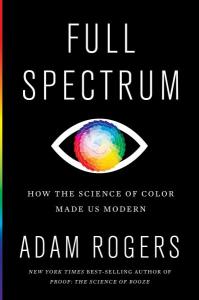
Adam Rogers—Full Spectrum: How the Science of Color Made Us Modern
HOW THE SCIENCE OF COLOR MADE US MODERN
Adam Rogers
Houghton Mifflin Harcourt, May 18, 2021, $28.00
ISBN-10: 1328518906; ISBN-13: 9781328518903
Rogers reports:
A couple of decades ago I learned about a pigment, a mineral used to give things color, called titanium dioxide. It’s ubiquitous in the human-made environment, because it’s bright white, very opaque, and has a higher refractive index than just about any other white pigment—so it’s a brightener and opacifier in not just white things but in paints, coatings, plastics, paper, drugs, foods, dyes, and on and on.
That got me hooked on trying to figure out how this stuff, which wasn’t invented until the beginning of the 20th century, fit into the millennia-long history of human beings making and trying to understand the physics, chemistry, neuroscience, and engineering of color.
I collected string on the idea for all those years, squirreling away journal articles, books, possible sources, and the occasional interview, like we all do. I dove into the research as a Knight Science Journalism Fellow. And then I sat on it until 2015, when the internet went crazy for a day about The Dress—a picture of a dress that looked blue and black to some people, and brown and white to others.I wrote an article about it, and finally realized there was a book in there. The story would start even before the appearance of human beings, or even eyeballs, and end with AI-controlled 3D printers forging paintings, and Pixar animators using lasers to make an audience see colors that aren't really there.
The same agent who worked on my first book, Eric Lupfer, agreed that we had another one. I found him thanks to recommendations from a lot of science-journalist friends.
If I had to advise aspiring book writers, I’d say to prepare for a lot of work—more reporting and rewriting than you would ever think possible. It’s not just a matter of 20-timesing a feature story. A book is supposed to be something of general interest, and yet also utterly idiosyncratic, something only you could make. So you want it to be good.
Contact info:
- Adam Rogers, 415-244-4557, adam@adam-rogers.net, @jetjocko
- Book: https://www.hmhco.com/shop/books/full-spectrum/9781328518903
- Publicist: Shara Alexander, 212-592-1156, shara.alexander@hmhco.com
- Agent: Eric Lupfer, 212-614-0778, eric@fletcherandco.com
NASW members: will your book be published soon? Take advantage of this opportunity for shameless self-promotion. Submit your report for Advance Copy.
Tell your fellow NASW members how you came up with the idea for your book, developed a proposal, found an agent and publisher, funded and conducted research, and put the book together. Include what you wish you had known before you began working on your book, or had done differently.
See https://www.nasw.org/advance-copy-submission-guidelines.
View Advance Copy archives at https://www.nasw.org/member-article/advance-copy.
Thinking of writing a book? If you are a NASW member, you may access a list of more than 200 books and online resources to help you craft your book proposal, find an agent and funding sources, negotiate your contract, learn about self-publishing, publicize and market your book, and more at https://www.nasw.org/article/write-book.
Send book info and questions about book publishing to Lynne Lamberg, NASW book editor, llamberg@nasw.org.
Follow @LynneLamberg on Twitter for news about science/medical books and writing.
Hero image by Garmin Bao on Unsplash.
Advance Copy
The path from idea to book may take myriad routes. The Advance Copy column, started in 2000 by NASW volunteer book editor Lynne Lamberg, features NASW authors telling the stories behind their books. Authors are asked to report how they got their idea, honed it into a proposal, found an agent and a publisher, funded and conducted their research, and organized their writing process. They also are asked to share what they wish they’d known when they started or would do differently next time, and what advice they can offer aspiring authors. Lamberg edits the authors’ answers to produce the Advance Copy reports.
NASW members: Will your book be published soon? Visit www.nasw.org/advance-copy-submission-guidelines for information on submitting your report.
Publication of NASW author reports in Advance Copy does not constitute NASW's endorsement of any publication or the ideas, values, or material contained within or espoused by authors or their books. We hope this column stimulates productive discussions on important topics now and in the future as both science and societies progress. We welcome your discussion in the comments section below.


